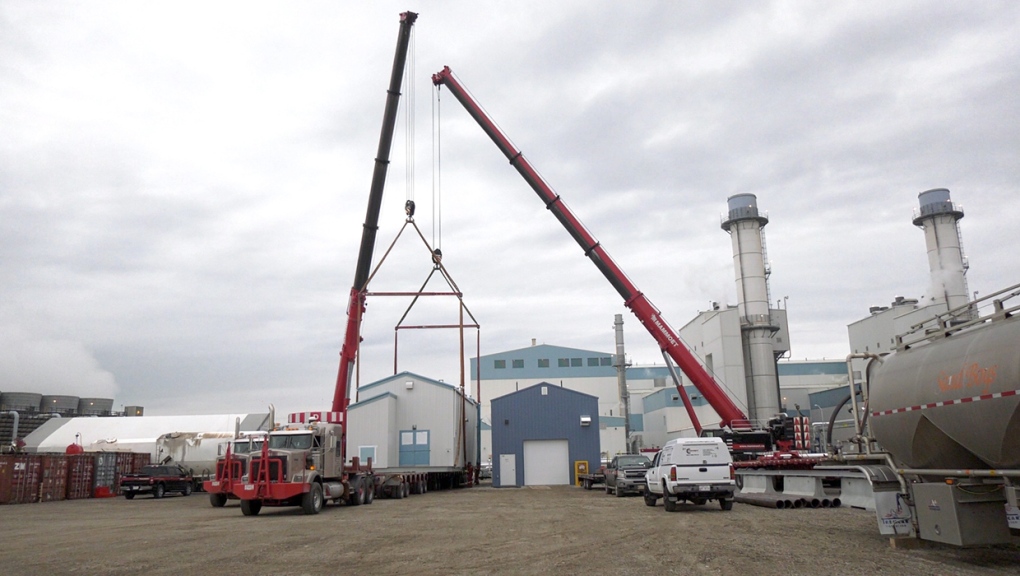Alberta prioritizes oil sands' carbon storage hub, energy minister says
 A giant carbon capture unit being lifted into place at the Shepard Energy Centre east of Calgary
A giant carbon capture unit being lifted into place at the Shepard Energy Centre east of Calgary
The government of Alberta, Canada's main oil-producing province, plans to move forward "very, very quickly" on its next carbon sequestration hub in the Cold Lake region that will serve oil sands producers, Energy Minister Sonya Savage told Reuters.
Alberta is currently accepting requests for proposals to operate an underground carbon storage hub serving the Alberta Industrial Heartland (AIH) zone near Edmonton. The process to select an operator for another hub near Cold Lake will come "on the heels" of that, Savage said in an interview late on Thursday.
"We are going to need to move on Cold Lake very, very quickly after Heartland," Savage said. "It's a hub that will give certainty to oil sands and heavy oil production."
The government is keen to move forward this year on several carbon storage hubs, where an operator will sequester both their own and third-party emissions, so industries in different areas of the provinces are not at a competitive disadvantage.
Carbon capture, utilization and storage (CCUS) is expected to be a key part of global efforts to contain emissions from fossil fuel production. It involves capturing carbon produced from heavy industrial processes like upgrading oil sands bitumen and storing it permanently underground.
"CCUS is probably my number one priority file at the moment," Savage said.
Fatih Birol, the head of the International Energy Agency, said on Thursday his organization considered CCUS to be one of the three most critical decarbonization technologies.
Alberta is aiming to aggressively expand its CCUS industry to help cut emissions and safeguard the future of its energy industry as the world aims for net-zero emissions by 2050. Savage's comments show how that plan is taking shape.
There has also been "tremendous interest" in a hub in the Grand Prairie region, where a lot of natural gas processing takes place, Savage added.
Alberta announced last year it would hold a competitive process for how it allocates underground pore space after a number of companies including Royal Dutch Shell, TC Energy and an alliance of oil sands producers proposed CCS projects.
Savage said the province received nearly 50 expressions of interest in leasing pore space rights from industries ranging from energy to petrochemicals to fertilizer production.
The government asked for formal proposals for the AIH first because they received the most interest in that area, and a number of proposals competing for the exact same underground pore space, Savage said.
Alberta plans to select the AIH sequestration hub operators by the end of March, and Savage said projects that will be up and running quickly are more likely to be successful.
"We have suggested to industry that time is of the essence, we'll be weighted more heavily towards project proposals that will be in service at an earlier date," she said.
Savage said all projects will have to go through a regulatory process, and would likely take a couple of years to start operating.
Reporting by Nia Williams Editing by Marguerita Choy
CTVNews.ca Top Stories

BREAKING Monthly earnings rise, payroll employment falls: jobs report
The number of vacant jobs in Canada increased in February, while monthly payroll employment decreased in food services, manufacturing, and retail trade, among other sectors.
Doctors say capital gains tax changes will jeopardize their retirement. Is that true?
The Canadian Medical Association asserts the Liberals' proposed changes to capital gains taxation will put doctors' retirement savings in jeopardy, but some financial experts insist incorporated professionals are not as doomed as they say they are.
Remains from a mother-daughter cold case were found nearly 24 years later, after a deathbed confession from the suspect
A West Virginia father is getting some sense of closure after authorities found the remains of his young daughter and her mother following a deathbed confession from the man believed to have fatally shot them nearly two decades ago.
Something in the water? Canadian family latest to spot elusive 'Loch Ness Monster'
For centuries, people have wondered what, if anything, might be lurking beneath the surface of Loch Ness in Scotland. When Canadian couple Parry Malm and Shannon Wiseman visited the Scottish highlands earlier this month with their two children, they didn’t expect to become part of the mystery.
What do weight loss drugs mean for a diet industry built on eating less and exercising more?
Recent injected drugs like Wegovy and its predecessor, the diabetes medication Ozempic, are reshaping the health and fitness industries.
2 military horses that broke free and ran loose across London are in serious condition
Two military horses that bolted and ran miles through the streets of London after being spooked by construction noise and tossing their riders were in a serious condition and required operations, a British government official said Thursday.
'It was instant karma': Viral video captures failed theft attempt in Nanaimo, B.C.
Mounties in Nanaimo, B.C., say two late-night revellers are lucky their allegedly drunken antics weren't reported to police after security cameras captured the men trying to steal a heavy sign from a downtown business.
Fair in Ontario, flurries in Labrador: Weather systems make for an erratic spring
It's no secret that spring can be a tumultuous time for Canadian weather, and as an unseasonably mild El Nino winter gives way to summer, there's bound to be a few swings in temperature that seem out of the ordinary. From Ontario to the Atlantic, though, this week is about to feel a little erratic.
He replaced Mickey Mantle. Now baseball's oldest living major leaguer is turning 100
The oldest living former major leaguer, Art Schallock turns 100 on Thursday and is being celebrated in the Bay Area and beyond as the milestone approaches.
































